Photo: Patrick McMullen/Getty Images
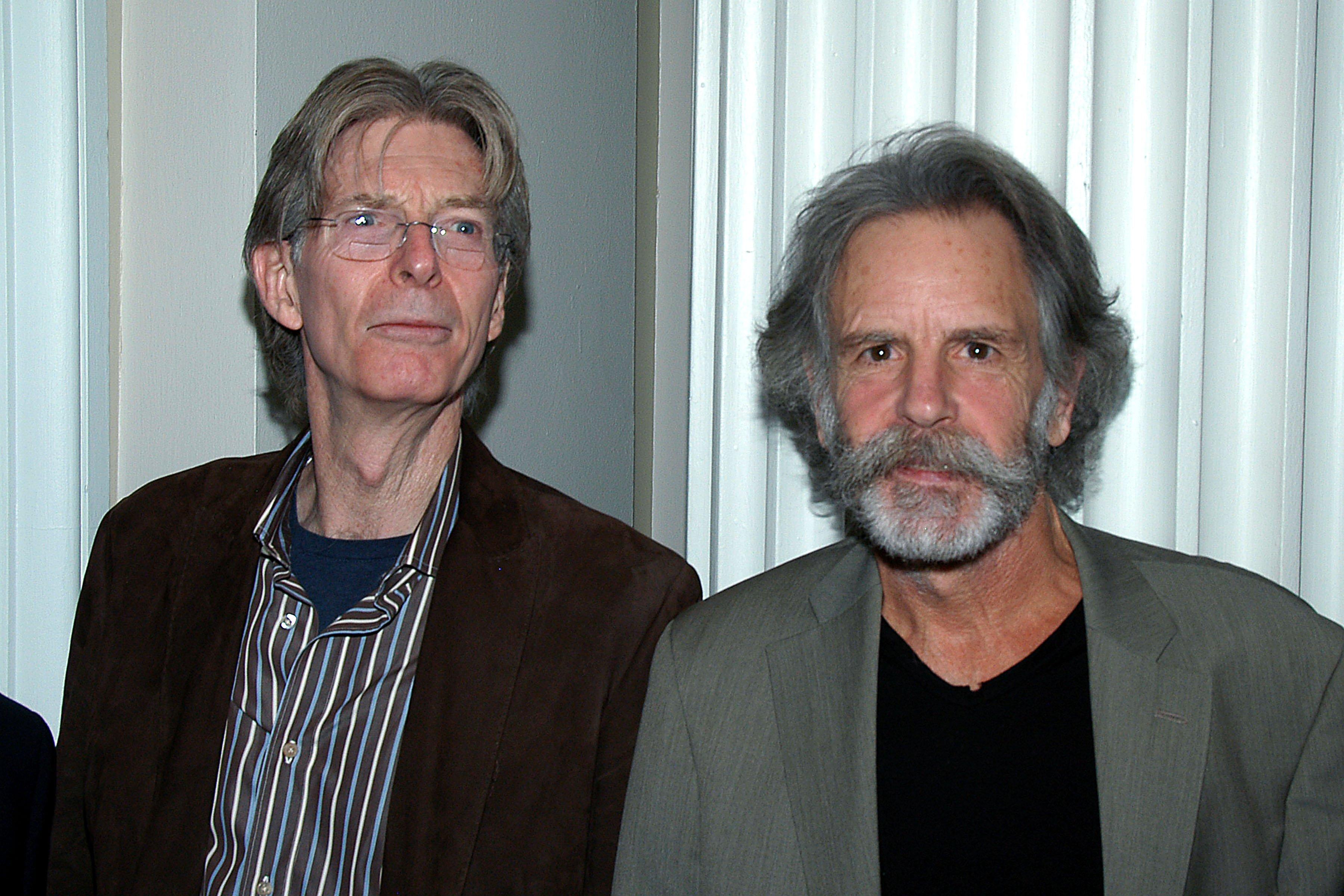
Phil Lesh and Bob Weir
news
Phil Lesh, Bob Weir Of Grateful Dead Announce First-Ever Duo Tour
The pair has scheduled a six-show tour in March 2018
Following the success of the Fare Thee Well 50th-anniversary shows in 2016, and subsequent extended tours across 2016–2017 as Dead & Company with guest guitarist John Mayer, Bob Weir and Phil Lesh — — two of the "core four" co-founders of the inexhaustible jam band the Grateful Dead — have announced their first-ever duo tour.
<iframe width="620" height="349" src="https://www.youtube.com/embed/8VSZV8u6R3o?rel=0" frameborder="0" gesture="media" allow="encrypted-media" allowfullscreen></iframe>
The three-city, six-show Bobby & Phil tour will be produced by Peter Shapiro, the concert and festival promoter best known for his Arrington, Va., Lockn' Festival and who helped put together the Dead's 2015 farewell shows.
"We're going to play everything we can think of," Lesh said in a statement to Billboard. "We're going to do [Bob Weir's] stuff, we're going to do my stuff, we're going to play [Jerry Garcia's] stuff, we'll do Grateful Dead stuff and we'll do covers. We're going to try and play everything we've ever played together and maybe some new stuff too."
The tour kicks off on March 2 at New York City's historic Radio City Music Hall, and wraps up in Chicago at the Chicago Theater on March 11.
"Verified Fan" presale opened today via Ticketmaster, and tickets for the general public will go on sale on Dec. 15 at 10 a.m. local time. More information is available at BobbyAndPhil.com.
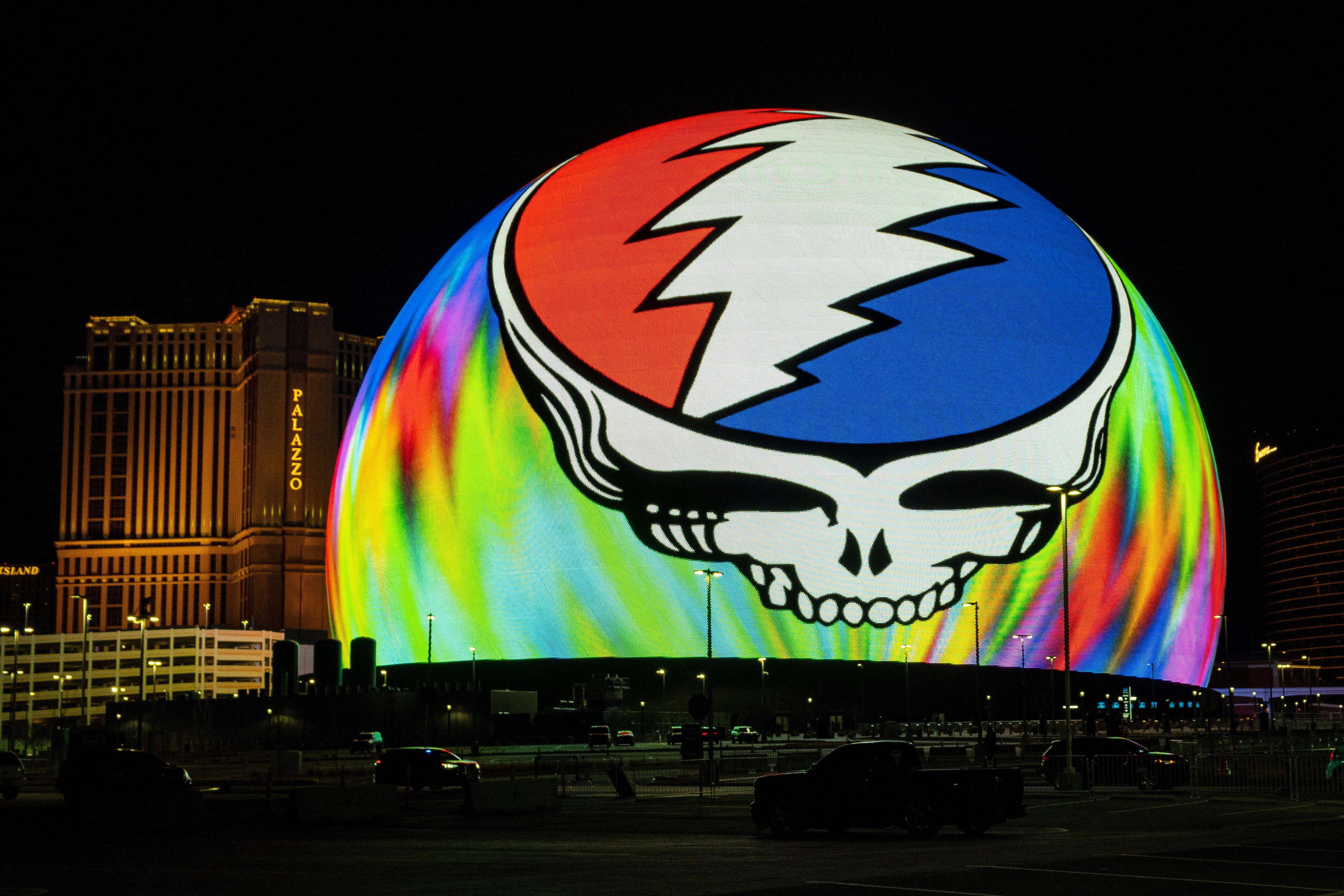
Photo: Kevin Carter
list
Why Dead & Company's Sphere Residency Is The Ultimate Trip
The 30-date Las Vegas residency is an unprecedented look at Dead & Co's live artistry. With stunning visuals and immersive technology, the Dead Forever residency takes attendees on an unpredictable, eye-popping vortex journey.
The scene on Saturday, July 13, was one mostly familiar to Dead & Company fans: Usual suspects Jeff Chimenti on keys, Oteil Burbridge on bass, Mickey Hart on drums, and John Mayer on guitar, a Silver Sky in hand. Grateful Dead co-founder Bob Weir dutifully approached the microphone to deliver one of the Dead’s best-known opening lyrics: "You tell me this town ain’t got no heart."
Throughout the evening, appreciative cheers and whistles sounded at the first notes of a classic, like this one, intermingling with the hints of marijuana in the air. The crowd of thousands, who’d traveled from both near and far for the occasion, swayed to the music. Largely clad in the tie-dye t-shirts customary to the Dead fandom, they comprised a vivid sea of color, visible even in the venue’s dimmest lighting.
Bathed in the glow of a key anomaly — a 160,000-square-foot curved LED canvas — a Deadhead sitting in the row ahead of me turns around and asks if I’m enjoying the show (I am). When I return the question, he is emphatic, his response succinct: "it’s transformative."
He’s not wrong in that the audiovisual spectacle — which wrapped its eighth of 10 weeks this past weekend — metamorphoses Dead & Company’s concert format. Since it debuted in May, the now 30-date Las Vegas residency, dubbed Dead Forever, has attracted old-school and new-generation Deadheads, as well as curious first-timers. From one-of-a-kind production tools, like its 16K LED display (the highest-resolution display in the world, per developers) and stereographic projection, Sphere has empowered Dead & Company to carry forth the legacy of one of the most fervently-loved bands in American music history, with unprecedented storytelling capacities and complete creative control.
Read on for four reasons why Dead & Company’s residency at Las Vegas’ most-talked-about venue is the rock outfit like they’ve never been seen before.
The Meeting Of Music & Visuals Allows For True Narration
For the nearly four hours that Dead & Company play each Thursday, Friday, and Saturday of a residency week, the domed venue adjacent to the Venetian transforms from Sphere to spaceship. Narratively, the show is stylized as a long, strange trip through space that issues nods to the Grateful Dead’s history.
It’s only fitting that this story begins in San Francisco, where the Dead’s townhouse in the heart of the Haight-Ashbury district becomes the focal point of the audiovisual journey’s intro. The 360-degree view of the Dead’s residence and the larger row of townhouses to which it belongs pans to a drone shot of the Bay Area at golden hour and soon thereafter, outer space.
Visually, attendees travel through time and space in an unpredictable, eye-popping vortex of fantasticality (and sometimes, reality). Take, for example, the segment that recreates the Dead’s performance at the Great Pyramid in Giza, Egypt. The scene is punctuated by black bats that flap swiftly through the desert landscape — a detail that comes as a surprise to those in the audience, and one ultimately added based on Weir’s recollection of this very phenomenon during the 1978 event, Mayer tells GQ.
Before Dead & Company bring Dead Forever full-circle by returning to 710 Ashbury Street at the show’s close, the show winds through a colorful, circuitous run of visuals: the Dead’s iconic technicolor dancing bears, Cornell University’s Barton Hall, and a wall made entirely of digital reproductions of Dead event posters and hard tickets. The show’s depth of reference is plunging, and Sphere’s technology allows the story to play like an abstract movie that blurs timelines, affording Dead & Company an unusual and nonpareil opportunity to leverage live storytelling in a way they’ve never before been able to.
While Dead Forever is accessible purely as a visual marvel, for the initiated, it is rife with Easter eggs. Its historical allusions are familiar touch points for the Deadheads who hopped on the metaphorical bandwagon back when Jerry Garcia was at its helm. Although some of its segments will evade those less fluent in the Dead’s storied past, they can nevertheless serve as educational gateways to it (and to greater, deeper fandom) for those who leave the show wanting to learn more.
Read more: A Beginner’s Guide To The Grateful Dead: 5 Ways To Get Into The Legendary Jam Band
In A Way, Everything Is New
Whether one has seen Dead & Company once, five times, 20 times, or never before matters not, for Dead Forever is a brand-new show. Familiarity with the Grateful Dead’s legacy and its contemporary offshoot's genesis certainly enriches the overall experience, but it’s not a requisite to enjoy the show, making the residency a particularly good entry point for the Dead & Company-curious who may have missed them on The Final Tour in 2023.
Dead Forever levels the playing field for attendees in that, apart from the songs on the setlist, the residency represents net-new material. The marriage of music and visuals makes each of the 18 tunes new from the standpoint of an audiovisual experience, and the novelty of Dead Forever deepens for even the most experienced Deadhead.
"When I was growing up, ‘Drums’ was always my bathroom song, but now you don’t want to miss it," an attendee tells GRAMMY.com at the end of the first set (Dead & Company play one six- or seven-song set and take a 30-minute intermission before beginning the evening’s second and final set).
A customary part of the Dead’s sets, "Drums/Space" is an extended percussion segment that takes on new life in Dead Forever. Led by Mickey Hart, the set two standout is where sound evolves into physical feeling. As this portion of the show starts, the curved LED canvas swirls with images of different drums that move wildly as Hart and Jay Lane (who stands in for Grateful Dead co-founding member, Bill Kreutzmann) diligently drum, steadily increasing the pace and intensity with which they do so. The instruments that grace Sphere’s screen are Hart’s own, the drummer tells Variety. Following 3D-photographing that enables them to be displayed in this fashion, an ensemble of at least 10 different drums joins the visual jamboree.
The cinematic, multisensory nature of this segment grows increasingly climactic, with the percussion becoming so thunderous it becomes physical. No surprise, considering Sphere’s immersive, crystal-clear sound system, or the fact that 10,000 of the venue’s 17,385 seats are haptic seats that can vibrate in time with the mounting percussion. This technology transforms "Drums/Space" and allows a customary piece of the Dead’s traditional sets to be heard, seen, and felt anew.
The Environment Is Unusually Immersive —And Intimate
Upon mention of Sphere’s size — the globe measures 875,000 square feet and can accommodate up to 20,000 people — "intimate" is not the first word to come to mind. Still, the venue felt remarkably intimate during Dead & Company’s final performance of July.
This was owed in equal parts to its self-contained design and its immersive visual environment, in which Sphere’s LED screen wraps over and behind the audience. However uncannily, the latter contributes to a sense of closeness, creating the illusion that Sphere, its visual displays, and its audience are situated much more closely than they actually are.
Its 580,000-square-feet of LEDs, coupled with its 360-degree shape and structure, render Sphere the most immersive live music venue in the world. To that end, it’s not hyperbolic or unreasonable to call Dead Forever Dead & Company’s most immersive live venture yet.
Of course, the Dead Forever narrative — a trip through space undertaken together, as one community — only adds to the show’s combined sense of intimacy and immersion.
No Show Is The Same
It’s not out of character for Dead & Company to play no repeats across consecutive evenings (as they did at San Francisco’s Oracle Park, where they laid their touring career to rest last July), and Dead Forever is no exception. Apart from "Drums/Space" — the sole item on the setlist that recurs each night — the 17 other songs that the band will play and their visual accompaniments are left to Dead & Company’s whim.
"What’s become really interesting — and I would say it’s a challenge, but it’s a really fun one — is that not only do you have to make the songs work in some kind of a flow for the setlist, but every piece of content has maybe eight or 10 songs that can go with it," Mayer told Variety.
No show is the same, yielding similar but unique viewing experiences across a given residency weekend and, more broadly, the portfolio of Dead Forever shows performed to date. This aspect has enticed avid fans to return not once, not twice, but three times in a given weekend, to see a fuller scope of what Dead Forever has to offer across its many possible variations.
With the residency’s July run now in the rearview, Dead & Company will take a brief break before returning to Sphere Aug. 1-3 and 8-10 for the final Dead Forever trips — for now.
Explore The World Of Rock

HARDY On New Album 'Quit!!' & How "Trying To Push My Own Boundaries" Has Paid Off
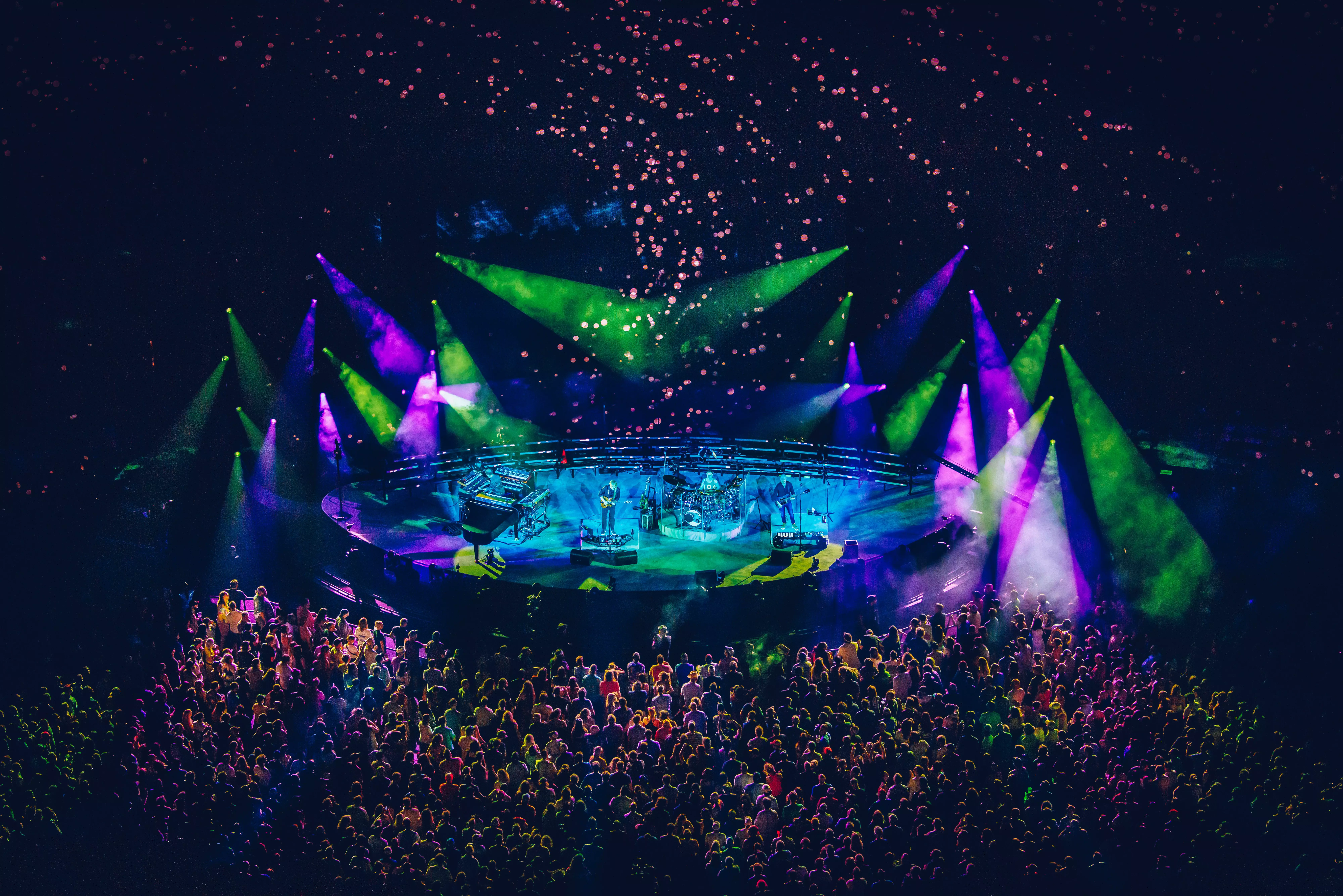
A Beginner’s Guide To Phish: 8 Ways To Get Into The Popular Jam Band
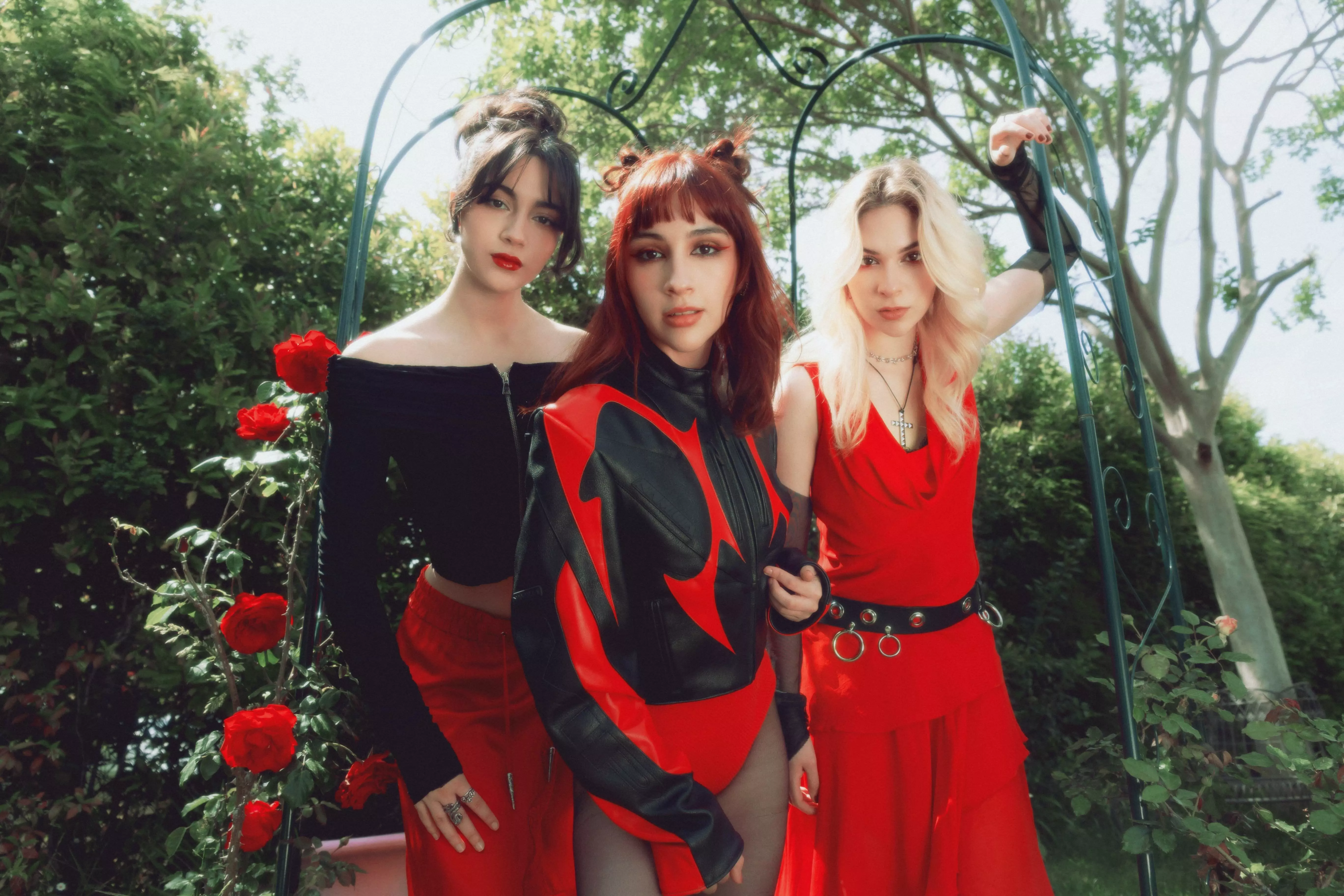
Mexican Rockers The Warning On 'Keep Me Fed' & "The Possibility That We Could Literally Do Everything"

Watch Red Hot Chili Peppers Win Best Rock Album
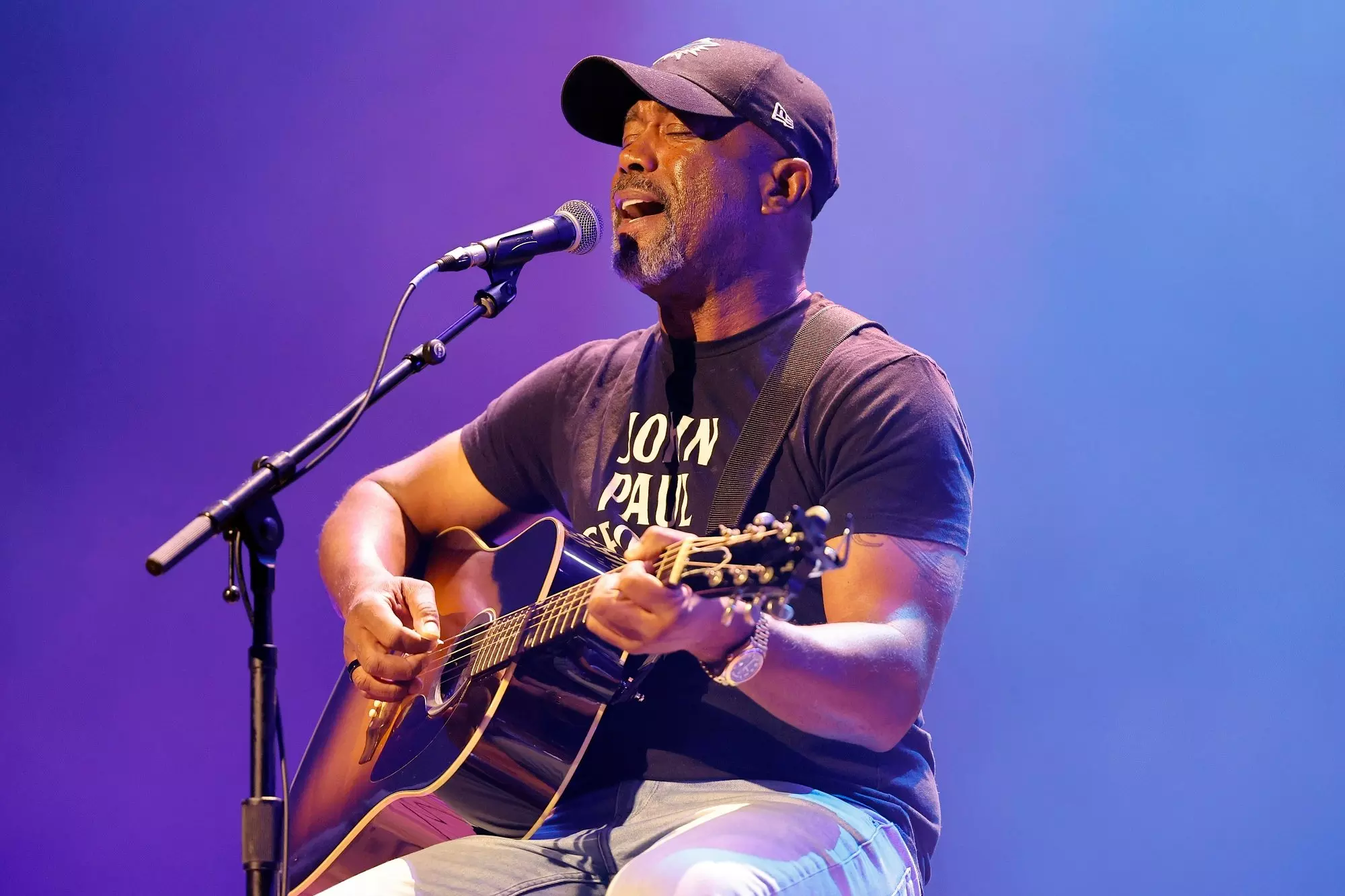
Darius Rucker Shares Stories Behind 'Cracked Rear View' Hits & Why He's Still Reveling In "A Dream Come True"

Photo: Rich Fury
list
A Beginner’s Guide To Phish: 8 Ways To Get Into The Popular Jam Band
Not a Phish phan? No worries. Ahead of their 26-date tour and new album, 'Evolve,' dig into this primer on the music and the subculture of the most popular jam band since the Grateful Dead.
Mainstream rock or pop, Phish are not. While the foursome from Vermont are definitely a jam band, that label does not capture their unique sound and varied influences. Both on record and live, Phish's extended improvisations noodle from reggae and all forms of rock, to bluegrass and funk, with healthy doses of country, blues and jazz.
Like the jam band godfathers the Grateful Dead, Phish built its devoted fanbase not through singles and airplay, but via tireless touring and word of mouth. On some nights — okay most nights — even the band has no clue where their rambling live shows will go. This spontaneity has been Phish's guiding ideology from its earliest days playing college campuses to their annual residency at Madison Square Garden; there is nothing contrived or calculated about a Phish show; instead, the band's filled with surprises and set lists that change more frequently than you change your bedsheets.
For more than 35 years now these four souls have been taking Phish-heads along on this joyous musical ride to unknown soundscapes. Concerts are fueled by passion, not perfection. Ask 10 Phish phans what their favorite live show is from the band’s history and likely each will offer a different answer and argue the reasons for their choice as if it were a thesis defense.
Read more: A Beginner’s Guide To The Grateful Dead: 5 Ways To Get Into The Legendary Jam Band
For Phish, it’s not about awards and accolades. The group has just one GRAMMY nomination and its highest charting single came and record came 30 years ago. In 1994, Billy Breathes peaked at No. 7 on the Billboard 200; its lead single "Free" hit No. 24 on the Billboard Hot Modern Rock charts and No. 11 on the Mainstream Rock Tracks chart.
What attracts people to Phish's music and subculture is the mood, the groove and the community; that’s why the band perennially have been one of the highest grossing live acts throughout their career. The band is also part of American pop culture: They have a Ben & Jerry’s flavor (Phish food), have appeared on "The Simpsons" and been parodied on "South Park."
This spring, Phish became only the second band (after U2) to perform at the Sphere in Las Vegas. Over the weekend of April 20, the foursome played four shows with a completely different set each night. The final show on Sunday evening featured an epic second set, even by Phish standards: the band performed for nearly two hours and jammed on for 34-minutes on "Down with Disease."
Surprises like this musical meandering abound at Phish shows and it’s another reason fans shell out a hefty chunk of their pay cheques to see them live again and again and again; it’s also what makes attending one of their concerts a unique experience. The relationship between the band and these devotees is symbiotic. Both inspire and guide the other.
Phish does not take itself too seriously. This is reflected in their songs, their artistic approach and their love of a good prank. Ready to go Phishing? Not the dictionary adjective that conjures negative connotations of scams and identity theft, but rather, a new word we suggest adding to the Urban Dictionary meaning to take a deep dive into the weird and wonderful world of Phish.
In advance of the band’s 26-date tour that starts with a three-night run in Mansfield, Massachusetts to promote Evolve — its 16th studio record that arrives July 12 — GRAMMY.com offers a lowdown on these musical merrymakers. Read on for a guide to appreciating and approaching Phish's lingo, lore, and lengthy discography.
Phish 101
Before the band had a name, a following, or conferences and university courses dedicated to the study of their music, they were just a bunch of college kids jamming in their dorm. The original members of the band met while attending the University of Vermont in Burlington. Initially formed as a trio in 1983 that featured guitarists Trey Anastasio and Jeff Holdsworth, along with drummer Jon Fishman. Bassist Mike Gordon joined that fall. In 1985, keyboardist Page McConnell was added and Holdsworth left. Today, it's these four (Anastasio, Gordon, Fishman and McConnell) that comprise Phish.
Junta, the band’s self-released debut arrived on cassette in 1989, followed by Lawn Boy the next year on Absolute A Go Go Records. The industry buzz created by their live shows then led to a multi-album deal with Elektra Records, who, in 1992, released their major label debut A Picture of Nectar, along with reissues of Junta and Lawn Boy.
What’s with the name? Everyone loves a good band name origin story, and there are often several versions of Phish's. The simplest and most popular one cited is that Fishman was asked at an early gig for the band’s name and thought they were asking for his name, so replied with his college nickname, "Fish." It stuck and they just changed the spelling.
A Lesson In Lingo: 4 Phish Phrases
Next up on the Phish syllabus is a lingo lesson in lingo. Overhear a pair of Phish fanatics chatting in a coffee shop, and you’ll wonder if they are speaking a different language. These devotees have developed their own lingo to express their love for all things Phish. Here’s a quick primer to help you converse with phans as if you know what you are talking about.
First, phans label each era of the band a number and these labels describe when their love of Phish began: 1.0 refers to the band’s beginnings until its first break in 2000; 2.0 is a short period and a small cohort of fans that starts when Phish returned from its first hiatus in 2002 and ends before they officially broke up in 2004. Finally, 3.0 refers to new converts: fans who discovered the band only after they reunited for good in 2009.
As this schooling on Phish continues, here are four words to drop into a conversation with a Phish fan to make you sound educated. "Noob" is a condescending word referring to a newbie, like post-2009 phans. A "chomper" is someone who talks during songs at a Phish concert (definitely a no-no). "Spunion" is someone whose appearance, actions and speech indicate they’ve taken way too many drugs. Finally, "hose" is a free-flowing improvisational jam where the music feels like it just flows directly into the listener’s ears.
Down On The Farm: Hits & A Few Phan Favorites
From the 2000 record of the same name, "Farmhouse" is one of the few Phish songs that made a splash beyond just their fans thanks to this radio-friendly chorus: "I never ever saw the Northern lights/I never really heard of cluster flies/ I never ever saw the stars so bright/ In the farmhouse, things will be alright." Besides this earworm, the ninth record from the band also featured another one of its biggest charting radio hits: "Heavy Things," which reached No. 29 on Billboard’s Adult Top 40 chart and No. 2 on the Adult Alternative Songs charts.
Some other key studio tracks to explore and listen to that show the depth and breadth of the band’s talents include: "Golgi Apparatus," "Chalkdust," "Torture," "Sample in a Jar," "Character Zero" and "Sand."
Into The Studio: A Choice Phish Records
Phish have released 20 studio albums and 53 live records. That’s a lot of music to sift through for any newbie. Three key albums to help understand and get into the band include: A Picture of Nectar (their major-label debut from 1992 that was certified gold), Hoist (1994) and The Story of the Ghost (1998), recorded at famed Bearsville Studios in in Woodstock, NY - a record Trey Anastasio described as "cow-funk." Listen carefully to this trio of records and you’ll come away from these deep dives either loving the band and ready to take the next step on this phishing trip or not.
Make sure to also check out the conceptual album Rift. This follow-up to their major-label debut is a fan favorite and also a critical darling. It’s possibly the band’s greatest studio creation, but it’s also an acquired taste. Rift follows the story of a man who dreams about the rift in his relationship with his girlfriend. The listener follows this protagonist on a dark and heavy ride as his emotional journey turns from a pleasant dream to a nightmare. The narrative is told backed by a sonic palette that showcases all of Phish’ colors and musical influences: from jazz and blues to psychedelic rock and funk.
Go See Phish Live
As Neil Young sang in "Union Man," that is often-quoted by concert lovers, "live music is better bumper stickers should be issued." Phish subscribe to this mantra and are known to plaster their cars in bumper stickers. The centerpiece of a Phish show is extended jams and the communion between Phish fans, but their concerts also feature amazing light shows, props, and pranks.
To get a sense of what attending a Phish concert is like, start with the six-disc set Hampton Comes Alive. Released Nov. 23, 1999, the collection consists of two concerts in their entirety captured at the Hampton Coliseum in Hampton, Virginia in 1998. The title plays on Frampton Comes Alive! — one of the best-selling live albums of all time.
In the band’s early days before the Internet came of age, bootleg tapes abounded. Trading these — just like Grateful Dead fans do — was always a part of Phish culture. LivePhish captured all of the band’s live shows. This is now an Android app where you can stream shows, past and present. Mere minutes after each Phish concert ends, the newest show is uploaded.
Before the streaming age, the band frequently released CDs up to six discs in length (most Phish concerts run more than three hours). One of these essential listening live releases is Darien Lake from Sept. 14, 2000 that includes a cover of Neil Young’s "Albuquerque."
Order Up The Baker’s Dozen
For Phish fans, the 13 concerts dubbed The Baker’s Dozen are pure bliss. The residency occurred at the Manhattan mecca from July 21 to Aug. 6, 2017. Every night featured a different set list (26 total sets as they played two each night). No song was repeated and each night had a theme.
Over the course of 13 shows, Phish played 237 songs. A highlight of The Baker’s Dozen was a 30-minute jam of "Lawn Boy" — a song that usually clocks in under four minutes.
Cover Me
Many consider the group the greatest cover band on earth, so go down the Phish YouTube rabbit hole and what matters at this moment in your life is sure to get neglected for a while.
An understanding of Phish's many collaborations and covers tis also essential to better appreciate the band. Phish has paid homage to everyone from classic rockers like Lynyrd Skynyrd, ZZ Top, Led Zeppelin and the Rolling Stones, to Frank Zappa and the Talking Heads. Collabs include: Bruce Springsteen, Neil Young, and weird as it sounds, even Jay-Z, who the band invited on stage during a Brooklyn gig in 2004, to sing-along on the 24-time GRAMMY-winner’s hits: "99 Problems" and "Big Pimpin.’"
Trick Or Treat Tributes & Auld Lang Syne Shenanigans
Halloween shows always feature musical costumes where Phish plays another artist’s album from front to back. The Beatles' White Album in 1994 is especially good and the first time the band premiered this concept. Many fans claim the 1998 Halloween show where the band covered the Velvet Underground’s Loaded is one of the most underrated and was mind blowing. But the best might be from 2018 when they invented a fake Scandinavian synth-rock outfit called Kasvot Växt.
For years, Phish have celebrated another year come and gone along with their fans, often playing a string of shows leading up to New Year’s Eve. Pranks are always a part of these special occasion gigs and there's often a theme with stages being transformed to transport their phlock to other realms.
Many of Phish’ most legendary end-of-year celebratory concerts occurred in New York City at Madison Square Garden where they’ve performed to close out the year 15 times. One of the most memorable saw the band "send in the clones" on Dec. 31, 2019, to ring in another new year.
Latest News & Exclusive Videos

2024 Paris Olympics Opening Ceremony: Watch Celine Dion, Lady Gaga, Gojira & More Perform

Ice Spice Is The Drill Queen On 'Y2K!': 5 Takeaways From Her Debut Album

New Music Friday: Listen To New Songs From Halsey, MGK And Jelly Roll, XG & More

Watch Young MC Win Best Rap Performance In 1990

The Red Clay Strays Offer A New Kind Of Religion With 'Made By These Moments'
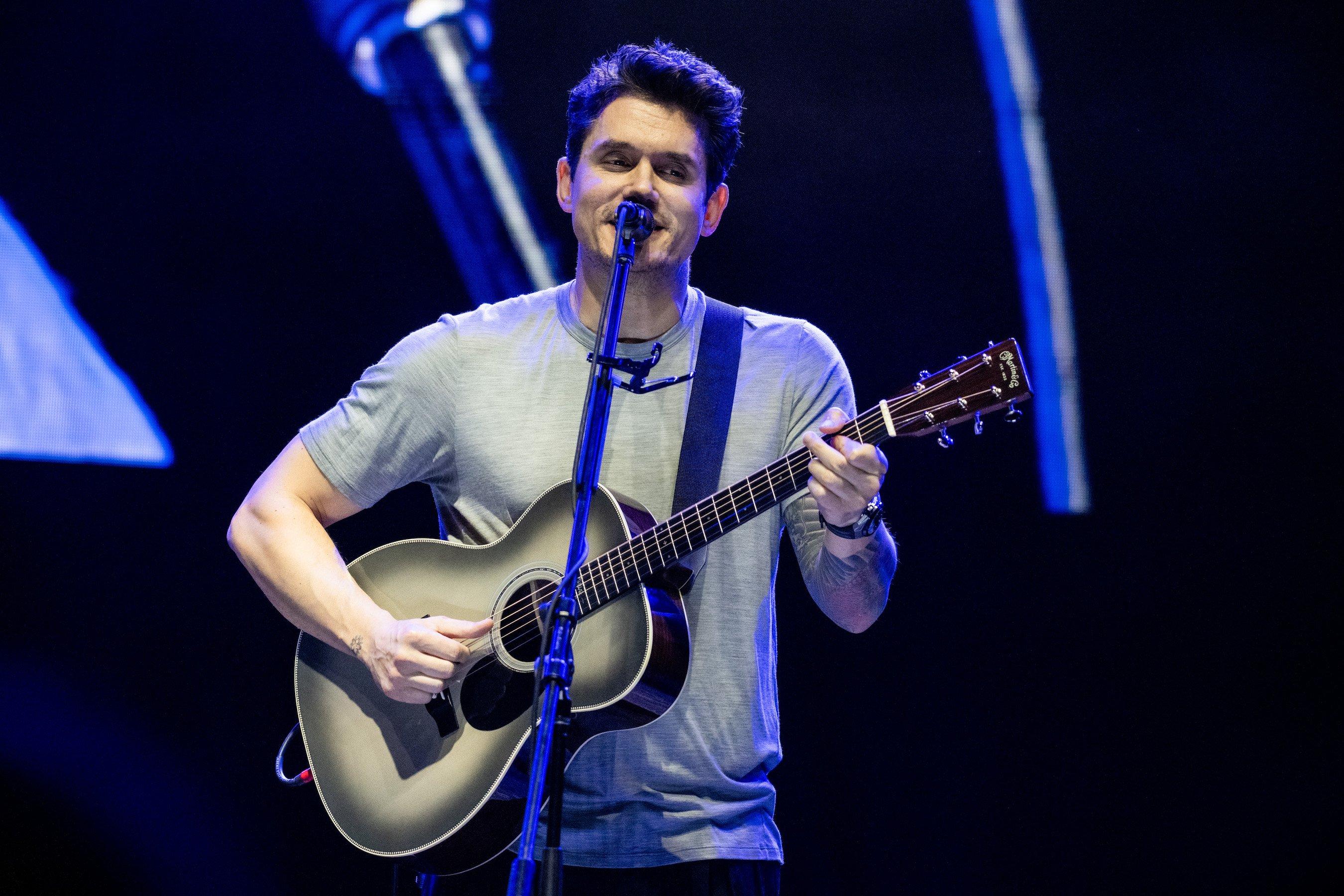
Photo: Timothy Norris/Getty Images
list
10 John Mayer Songs That Show His Versatility, From 'Room For Squares' To Dead & Co
As John Mayer launches his latest venture with Dead & Company — a residency at the Sphere in Las Vegas — revisit 10 songs that show every side of his musical genius.
At the 2003 GRAMMYs, a 25-year-old John Mayer stood on stage at Madison Square Garden, his first golden gramophone in hand. "I just want to say this is very, very fast, and I promise to catch up," he said with a touch of incredulity.
In the two decades that have followed his first GRAMMY triumph, it's safe to say that Mayer, now 46, has caught up. Not only has the freewheeling guitarist and singer/songwriter won six more GRAMMYs — he has also demonstrated his versatility across eight studio albums and countless cross-genre collaborations, including his acclaimed role in The Grateful Dead offshoot, Dead & Company. But the true testaments to his artistic range lie simply within the music.
Over the years, Mayer's dynamism has led him to work deftly and convincingly within a wide variety of genres, from jazz to pop to Americana. The result: an elastic and well-rounded repertoire that elevates 2003's "Bigger Than My Body" from hit single to self-fulfilling prophecy.
From March 2023 to March 2024, Mayer took his protean catalog on the road for his Solo Tour, which saw him play sold-out arenas around the world, mostly acoustic, completely alone. The international effort harkened back to Mayer's early career days, when standing alone on stage, guitar in hand, was the rule rather than the exception. Just after his second Solo leg last November, Mayer added radio programming and curation to his resume via the launch of his Sirius XM channel, Life with John Mayer. Fittingly, XM bills the channel (No. 14) as one notably "defined not by genre, but by the time of day, as well as the day of the week."
Mayer's next venture sees him linking back up with Dead & Company, for a 24-show residency at the Sphere in Las Vegas from May 16 to July 13. In honor of his latest move, GRAMMY.com explores the scope of Mayer's musical genius by revisiting 10 essential songs that demonstrate the breadth of his range, from the very beginning of his discography.
"Your Body Is A Wonderland," Room For Squares (2001)
The second single from Mayer's debut album, "Your Body Is A Wonderland" became an almost instant radio favorite like its predecessor, "No Such Thing," earning Mayer his second consecutive No. 1 on Billboard's Adult Alternative Airplay chart. The song's hooky pop structure provided an affable introduction to Mayer's lyrical skill by way of smart, suggestive simile and metaphor ("One mile to every inch of/ Your skin like porcelain/ One pair of candy lips and/ Your bubblegum tongue") ahead of Room For Squares' release later that June. The breathy hit netted Mayer his first career GRAMMY Award, for Best Male Pop Vocal Performance, at the 45th Annual GRAMMY Awards in 2003.
In recent years, Mayer — who penned the song when he was 21 — has chronicled his tenuous relationship with "Your Body is a Wonderland" in his infamous mid-concert banter, playfully critiquing the song's lack of "nuance." Following a perspective shift, Mayer has come to embrace his self-proclaimed "time capsule"; it was a staple of his set lists for his Solo Tour.
"Who Did You Think I Was," TRY! - Live in Concert (2005)
The product of pure synergy and serendipity, the John Mayer Trio assembled after what was intended to be a one-time stint on the NBC telethon, "Tsunami Aid: A Concert of Hope," in 2005. The benefit appearance lit the creative fuse between Mayer, bassist Pino Palladino and drummer Steve Jordan — who, over the years, have also played alongside the singer on his headline tours.
The John Mayer Trio propelled its eponymous artist from pop territory to a bluesy brand of rock 'n' roll that then demonstrated his talent as a live guitarist to its greatest degree yet. The Trio's first and only release, TRY! - Live in Concert, was recorded at their September 22, 2005 concert at the House of Blues in Chicago.
Mayer acknowledges his abrupt sonic gear shift on TRY! opener, "Who Did You Think I Was." "Got a brand new blues that I can't explain," he quips, then later asks, "Am I the one who plays the quiet songs/ Or is he the one who turns the ladies on?"
"Gravity," Continuum (2006)
Though "Waiting On the World to Change" was the biggest commercial hit from 2006's Continuum, "Gravity" remains the pièce de résistance of Mayer's magnum opus. Its status as such is routinely reaffirmed by the crowds at Mayer's concerts, whose calls for a live performance of his quintessential soul ballad can compete even with Mayer's mid-show remarks.
The blues-tinged slow burn marries Mayer's inimitable vocal tone with his guitar muscle on a record that strides far beyond the pop and soft rock of his preceding studio albums. Though Continuum builds on the blues direction Mayer ignited with TRY!, it does so with greater depth and technique, translating to a concept album, sonically, that evinces both his breakaway from the genres that launched his career and his skill as a blues guitarist — and "Gravity" is a prime example.
"I'm very proud of the song," Mayer mused on his Sirius XM station. "It's one of those ones that's gonna go with me through the rest of my life, and I'm happy it's in the sidecar going along with me."
"Daughters," Where the Light Is: John Mayer Live in Los Angeles (2008)
"Daughters" wasn't Mayer's first choice of a single for his sophomore LP, 2003's Heavier Things, but at Columbia Records' behest — "We really want it to go, we think it can be a hit," Mayer recalled of their thoughts — the soft-rock-meets-acoustic effort joined the album rollout. Columbia's suspicions were correct; "Daughters" topped Billboard's Adult Pop Airplay in 2004 — his only No. 1 entry on the chart to date.
But "Daughters" didn't just enjoy heavy radio rotation — it also secured Mayer his first and only GRAMMY win in a General Field Category. The Heavier Things descendant took the title of Song Of The Year at the 47th Annual GRAMMY Awards in 2005, helping Mayer evade music's dreaded "sophomore slump."
While the studio version may be the GRAMMY-winning chart-topper, Mayer's live rendition of "Daughters" during his December 8, 2007 performance at Los Angeles' Nokia Theater for Where the Light Is: John Mayer Live in Los Angeles compellingly demonstrated the power of the song — and his acoustic chops.
"Edge of Desire," Battle Studies (2009)
Come 2009, what critics almost unanimously proclaimed to be Mayer's biggest musical success had become his Achilles heel; everyone wanted another Continuum. But as they were to learn, Mayer never repeats himself. Thus came Battle Studies.
Born from a dismantling and transformative breakup, his fourth studio album arguably only becomes fully accessible to listeners after this rite of passage. Mired in introspection and pop rock, Battle Studies broadly engages with elements of pop with a sophistication that distinguishes it from Mayer's earlier traverses in pop and pop-inflected terrain.
His artistry hits a new apex on "Edge of Desire," a visceral and tightly woven song that remains one of the strongest examples of his mastery of prosody — the agreement between music and lyrics that results in a resonant and memorable listening experience.
"Born and Raised," Born & Raised (2012)
On the title track of his fifth studio album, Mayer distills growing up (and growing older) into a plaintive reflection on the involuntary, inevitable, and, in the moment, imperceptible phenomenon. He grapples with this vertigo of the soul on a record that, 12 years later, remains among his most barefaced lyrically.
The tinny texture of a harmonica, heard first in the intro, permeates the song, serving as its single most overt indicator of the larger stylistic shift that Born & Raised embodies. The 12-song set embraces elements of Americana, country and folk amid simpler-than-usual chord progressions for Mayer, whose restraint elevates the affective power of the album's lyricism.
"Born and Raised - Reprise," with which Born & Raised draws to a close, is evidence of Mayer's well-demonstrated dexterity. In its sanguine, folk spirit, the album finale juxtaposes "Born and Raised" both musically and lyrically. "It's nice to say, 'Now I'm born and raised,'" Mayer sings as the last grains of sand in Born & Raised's hourglass fall.
"Wildfire," Paradise Valley (2014)
Even before Paradise Valley hit shelves and digital streaming platforms, the cowboy hat that Mayer dons in the album artwork intimated that the hybrid of Americana, country, and folk he embraced on Born & Raised wasn't going anywhere — at least not for another album. The sunbaked project was a gutsy sidestep even further away from his successful commercial formula, and finds him expanding his stylistic fingerprint across 11 tracks that run the gamut of American roots music.
"Wildfire," the breezy toe-tapper with which Paradise Valley opens, grooves with Jerry Garcia influence. It is therefore unsurprising that many interpret "We can dance with dead/ You can rest your head on my shoulder/ If you want to get older with me," to be a lyrical nod to the Dead. Perhaps uncoincidentally, Mayer's invitation to become a member of Dead & Company came one year after the release of Paradise Valley.
"Shakedown Street," Live at Madison Square Garden (2017)
There is perhaps no better example of Mayer's dynamism than his integration in Dead & Company. The Grateful Dead offshoot, formed in 2015, intersperses Mayer among three surviving members of the band — Bob Weir, Mickey Hart, and Bill Kreutzmann — as well as two more newcomers, Oteil Burbridge and Jeff Chimenti. Mayer's off-the-cuff guitar solos and vocal support at Dead & Co's concerts are the keys that have unlocked a new plane of musicianship for Mayer, the solo artist.
This is evident on "Shakedown Street," a staple of The Grateful Dead's – and now, Dead & Company's – set lists. The languid, relaxed number gives Mayer the space to improvise guitar solos and use his vocals in a looser style than how he sings his own productions, all while feeding off the energy of his fellow band members. In addition to being one of The Dead's best-known songs, "Shakedown Street" is also the name of the makeshift bazaar where "Deadheads" socialize and sell wares ranging from grilled cheeses to drink coasters emblazoned with The Grateful Dead logo outside Dead & Company concerts.
Mayer's long, strange trip with (and within) the jam band has cross-pollinated his and The Grateful Dead's respective fandoms, attracting scores of Dead & Co listeners to his own headline shows, and vice versa. The takeaway: Mayer's involvement with Dead & Company offers a new, comparatively more rugged and improvisational lens through which to view his artistry.
"You're Gonna Live Forever in Me," The Search for Everything (2017)
"You're Gonna Live Forever in Me" evokes the sense of walking in, unexpected and undetected, to one of Mayer's writing sessions, watching him sing the freshly-penned piano ballad. This is owed to the song's abstract lyricism, the sentiment of which is deeply personal and universally accessible — a juxtaposition that's not often easy to achieve in songwriting. (Take, for example, "A great big bang and dinosaurs/ Fiery raining meteors/ It all ends unfortunately/ But you're gonna live forever in me.") But the studio version of "You're Gonna Live Forever in Me" also happens to be the original vocal take, adding to the feeling that Mayer is fully engrossed in a moment of poignant reflection mediated by music.
"I sat at the piano for hours teaching myself how the song might go. I sang it that night, and that was it…I couldn't sing the vocals again if I tried," Mayer recalled in a 2017 interview with Rolling Stone.
Mayer's lilted, Randy Newman-esque singing on the track finds him unintentionally but impactfully adopting a vocal technique distinctive from anything he's ever done before.
"Wild Blue," Sob Rock (2021)
Buoyed by a honeyed hook and slick production from No I.D., "New Light" was the unequivocal commercial standout of Sob Rock, a soft-grooving pastiche of '80s influence. Though the catchy pop-informed number finds Mayer stylistically diversifying by working with "The Godfather of Chicago Hip-Hop" (whose credits include Kanye West, JAY-Z, and Common, to name just a few), a look beyond the Sob Rock frontrunner reveals evidence of more sonic experimentation on the album.
Cue "Wild Blue." In its hushed, double-tracked vocals, the song plays like a love letter to JJ Cale. Mayer's whispery vocal emulation of the rock musician yields another new, but still polished, strain of John Mayer sound.
With hints of the '70s embedded within its taut production, "Wild Blue" is a beatific semi-departure from its parent album's '80s DNA. Together, they evince Mayer's ability to work not only across genres but also across sounds from different decades in music — further proof that his artistic range is both broad and timeless.
A Beginner’s Guide To The Grateful Dead: 5 Ways To Get Into The Legendary Jam Band

Photo: Jeff Kravitz/FilmMagic
video
GRAMMY Rewind: Kendrick Lamar Honors Hip-Hop's Greats While Accepting Best Rap Album GRAMMY For 'To Pimp a Butterfly' In 2016
Upon winning the GRAMMY for Best Rap Album for 'To Pimp a Butterfly,' Kendrick Lamar thanked those that helped him get to the stage, and the artists that blazed the trail for him.
Updated Friday Oct. 13, 2023 to include info about Kendrick Lamar's most recent GRAMMY wins, as of the 2023 GRAMMYs.
A GRAMMY veteran these days, Kendrick Lamar has won 17 GRAMMYs and has received 47 GRAMMY nominations overall. A sizable chunk of his trophies came from the 58th annual GRAMMY Awards in 2016, when he walked away with five — including his first-ever win in the Best Rap Album category.
This installment of GRAMMY Rewind turns back the clock to 2016, revisiting Lamar's acceptance speech upon winning Best Rap Album for To Pimp A Butterfly. Though Lamar was alone on stage, he made it clear that he wouldn't be at the top of his game without the help of a broad support system.
"First off, all glory to God, that's for sure," he said, kicking off a speech that went on to thank his parents, who he described as his "those who gave me the responsibility of knowing, of accepting the good with the bad."
Looking for more GRAMMYs news? The 2024 GRAMMY nominations are here!
He also extended his love and gratitude to his fiancée, Whitney Alford, and shouted out his Top Dawg Entertainment labelmates. Lamar specifically praised Top Dawg's CEO, Anthony Tiffith, for finding and developing raw talent that might not otherwise get the chance to pursue their musical dreams.
"We'd never forget that: Taking these kids out of the projects, out of Compton, and putting them right here on this stage, to be the best that they can be," Lamar — a Compton native himself — continued, leading into an impassioned conclusion spotlighting some of the cornerstone rap albums that came before To Pimp a Butterfly.
"Hip-hop. Ice Cube. This is for hip-hop," he said. "This is for Snoop Dogg, Doggystyle. This is for Illmatic, this is for Nas. We will live forever. Believe that."
To Pimp a Butterfly singles "Alright" and "These Walls" earned Lamar three more GRAMMYs that night, the former winning Best Rap Performance and Best Rap Song and the latter taking Best Rap/Sung Collaboration (the song features Bilal, Anna Wise and Thundercat). He also won Best Music Video for the remix of Taylor Swift's "Bad Blood."
Lamar has since won Best Rap Album two more times, taking home the golden gramophone in 2018 for his blockbuster LP DAMN., and in 2023 for his bold fifth album, Mr. Morale & the Big Steppers.
Watch Lamar's full acceptance speech above, and check back at GRAMMY.com every Friday for more GRAMMY Rewind episodes.
10 Essential Facts To Know About GRAMMY-Winning Rapper J. Cole
